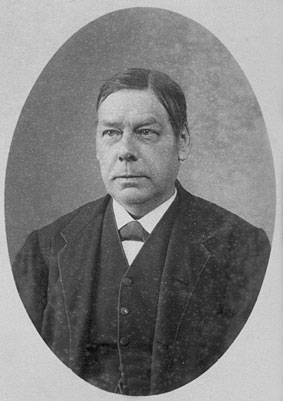- Jan Kappeyne van de Coppello
Infobox Prime Minister
name =Jan Kappeyne van de Coppello

order =Prime Minister of the Netherlands
term_start = 3 November 1877
term_end = 20 August 1879
deputy =
predecessor =Jan Heemskerk
successor =Constantijn Theodoor van Lynden van Sandenburg
birth_date =birth date|1822|10|2|df=y
birth_place =The Hague ,Netherlands
death_date = death date and age|1895|7|28|1822|10|2|df=y
death_place = The Hague, Netherlands
spouse = "not married"
religion =Dutch Reformed
constituency = The Hague, Netherlands
party = Liberal
languagesspoken =Dutch
Joannes (Jan) Kappeyne van de Coppello (
The Hague , 2 October 1822 - The Hague, 28 July 1895) was a Dutch liberal politician. He was prime minister of the Netherlands between 1877 and 1879.Career
Career before politics
After attending the public primary school Outercourt in the Hague, Kappeyne was home schooled by his father, who was rector of the gymnasium of the Hague and taught Greek, as secondary education.
Guillaume Groen van Prinsterer , a prominent protestant-christian politician, became his guardian after the death of his father in 1840. In that year he began to study Roman and contemporary law at theUniversity of Leiden . In 1845 he became lawyer in the Hague. In 1860 Kappeyne was elected into the city council of the Hague, as a liberal.Political career
In 1862 Kappeyne was elected into the lower house of parliament as a liberal for the Hague. He was elected on a 'Puttian' ticket.
Fransen van de Putte , who was a minister at the time, wanted to steer a more conservative colonial course. In the 1866 elections he was defeated by the conservative F. de Casembroot.In 1871 he was elected into the lower house of parliament as a liberal for
Haarlem , defeating the conservative W. van Golstein. In the 1875 elections he defeat the conservative M.J. van Lennep. He was political leader of the liberals between 1876 and 1877. In parliament he was known for his comical amendments.In 1877 Kappeneye was "
formateur " of a liberal cabinet. Kappeyne becameminister of Home Affairs , and he gave up his seat in parliament. He was appointed chairperson of the council of ministers (de facto prime minister), formally temporarily, but he was the political leader of the cabinet.As minister he enacted important laws, such as a new law on primary education. This law put higher demands on the quality of school buildings and the pay and education of teachers. This raised the financial burdens of primary schools, only public schools received state subsidies however. Religious schools, which were not able to sustain the financial burdens, were in effect forbidden. This led to staunch opposition of anti-revolutionary andcatholic members of parliament, and a citizen's petition. Kappeyene however did not change his mind.On 10 June 1879 the law on the channels which he proposed was rejected by parliament. Kappeyne asked the King to dismiss him. King William III refused however. On 2 July, he asked the King to allow a constitutional revision, William III refused, and Kappeyne asked the King to dismiss him again, and William III finally dismissed Kappeyne. Behind the fall of the cabinet Kappeyne lay a conflict between the factions of the progressive liberals and the more moderate liberals.
Career after politics
In 1879 he returned to his lawyer's office in the Hague. But Kappeyne attempted to gain a seat in parliament in the 1880, 1883 and 1884 elections, he was however defeated every time. In 1880 he was defeated over the district of
Amsterdam by the liberal J.G. Gleichman, in 1883 in Amsterdam by the liberal-conservative A. Gildemeester, and in 1884 by the liberal J. Duijvis. He remained lawyer until his death in 1895. In this period he refused a request by the University of Leiden to become honorary professor of law. In 1888 Kappeyne was elected into the higher house of parliament as a liberal forNorth Holland . In the higher house, Kappeyne took a more conservative course as he had previously done and remained a backbencher.Miscellaneous facts
*He was seen as an amusing debater, a workaholic and a skilled lawyer;
*The name Kappeyne, which was godgrandmothers, was added in 1811 to the name Van de Coppello by his father;
*He was known to work in the night until dawn, preferably in his negliceé lying on the floor of the living room, surrounded by books and papers;
*Kappeyne did not care particularly for clothes and appearances, he often looked ragtag;
*He was made Knight in theOrder of the Netherlands Lion in 1874 and he was promoted to Commander in the order of the Dutch Lion in 1878;
*Kappeyne remained unmarried;
*He was a member of theDutch Reformed church .External links
* [http://www.parlement.com/9291000/biof/00674 profile on parlement.com]
Wikimedia Foundation. 2010.
